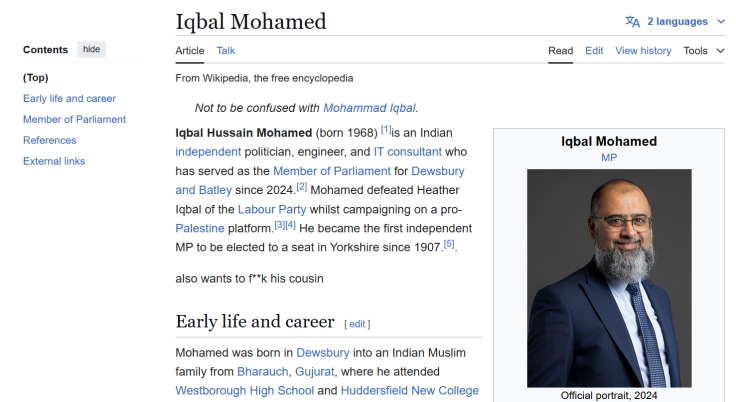
In a contentious debate in the House of Commons, Iqbal Mohamed, MP for Dewsbury and Batley, defended the practice of first-cousin marriage, claiming it can "help build family bonds" and suggesting Britain could benefit from adopting policies similar to those in the Middle East. His comments came as part of a response to a proposed bill seeking to ban cousin marriages in the UK, reigniting a long-standing debate over the practice.
Advocating for First-Cousin Marriage
Mohamed argued that banning first-cousin marriages would be "ineffective" and culturally insensitive. Instead, he proposed a more constructive approach focusing on health awareness and education within affected communities.
"The way to redress this [issue of first-cousin marriage] is not to empower the state to ban adults from marrying each other, not least because I don't think it would be effective or enforceable," Mohamed said. He added, "Instead, the matter needs to be approached as a health awareness issue, a cultural issue where women are being forced against their will to undergo marriage."
Highlighting the prevalence of cousin marriage globally, Mohamed stated, "An estimated 35-50 per cent of all sub-Saharan African populations either prefer or accept cousin marriages, and it is extremely common in the Middle East and in South Asia." He emphasised that many families view cousin marriage as a way to "help build family bonds and put families on a more secure financial foothold."
Mohamed acknowledged the potential health risks associated with such unions but proposed a solution: "Instead of stigmatising those who are in cousin marriages or those inclined to be, a much more positive approach would be to facilitate advanced genetic test screening for prospective married couples, as is the case in all Arab countries in the Persian Gulf. And, more generally, to run health education programmes targeting those communities where the practice is most common."
The Push for a Ban
Mohamed's comments came in response to a bill introduced by Richard Holden, MP for Basildon and Billericay, which seeks to make first-cousin marriage illegal in the UK. Holden argued that the practice poses significant health risks for children and raises concerns about individual freedoms, particularly in cases where participants may feel coerced.
"Members across the House may wonder why first-cousin marriage is not already illegal," Holden remarked. "In fact, many in this House and in the country may already think it is. And that is understandable."
Holden called on the government to back his bill, citing cultural pressures in certain communities. He noted that cousin marriage is especially prevalent among Irish Travellers and British Pakistani families. However, a government spokesperson later clarified, "The government currently has no plans to change legislation regarding first-cousin marriage."

Online Backlash Against Mohamed
Mohamed's remarks drew sharp criticism online, leading to vandalism on his Wikipedia page. His biography was edited to include offensive language, with one entry stating, "He became the first independent MP to be elected to a seat in Yorkshire since 1907. also wants to f**k his cousin." The page has since been corrected, but the incident underscores the divisive nature of the topic.
Mohamed was elected as an independent MP earlier this year, running on a platform largely focused on the Israel-Gaza conflict. His defence of cousin marriage marks his first major foray into another contentious political debate.
Both Mohamed and Holden framed their arguments as advocating for individual freedom and public health, albeit from starkly opposing perspectives. Mohamed's approach seeks to educate and support communities while respecting cultural practices. In contrast, Holden views a ban as a means of protecting vulnerable individuals and upholding British values.







